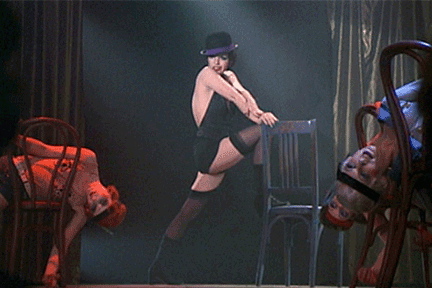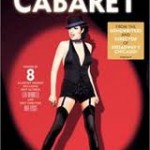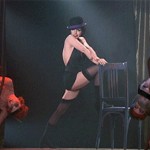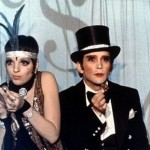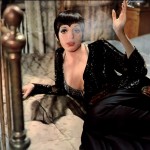Cabaret is one of those musicals that stay long in the mind and can be read at different levels. If you wanted to take it as a musical romantic comedy played against the rise of the Nazis you could do so with safety and a clear conscience, but while it wears a political edge lightly, there are plenty of reminders of the reality of life during those years. But then the source material here is Christopher Isherwood’s six semi-autobiographical short stories Goodbye to Berlin and the later stage play I Am A Camera, in which the threat of the Nazis looms over the decadent Weimar Republic and the characters therein.
Kander and Ebb’s stage musical Cabaret, with choreography and movie direction by the late great Bob Fosse, was adapted further for the big screen (a number of the characters were changed) but subtly politicised in the process. For example Meeskite (Yiddish word for an ugly woman) was excluded and the final line of the song If You Could See Her Through My Eyes was changed from “she isn’t a meeskite at all” to “she wouldn’t look Jewish at all.” The inclusion of the song Tomorrow Belongs To Me is also notable, sung initially by a lone Nazi at a restaurant, but then chillingly and symbolically opening out so all the diners join in. Maybe This Time and Money was also added for the movie version, and most viewers can’t imagine Cabaret without it.
The Nazi number apart, the music and cabaret in Cabaret is almost entirely confined to the microcosm of life that is the Kit Kat Klub, overseen by the wily emcee (Joel Grey) who won an Oscar for a great and slightly sinster performance for the paying public in the club and a subtly greater one for the movie audience, especially the wonderful opening number Wilkommen and the finale Farewell. He introduces the singer, the immature would-be ingenue cabaret Sally Bowles, who delights in showstopping numbers as Farewell Mein Lieber Herr, Maybe This Time and Cabaret itself.
The club action (“Where are all your troubles now? Forgotten!”) is contrast sharply with real life between the club and the complications of the outside world. Naive academic Brian Roberts comes to Berlin to work and has his eyes opened by Nazi anti-Semitism, the ditzy Bowles, the charming and wealthy Maximilian von Heune, penniless but equally charming ladies’ man Fritz Wendel and the love of Wendel’s life, the even wealthier Natalia Landauer. Roberts and Bowles fall for one another but you know from the start it is ill-fated. Indeed, they both also fall for the bisexual von Heune in one of several subplots.
One irony is the role reversal that saw Roberts, the American academic from the book and stage musical, morphed into the very English Michael York and Sally Bowles transformed into the gargantuan personality that is Liza Minnelli. The problem with Minnelli is that for Sally Bowles she is way, way too good to be a so-so singer in a seedy nightclub. She is totally riveting, never better, and just as riveting out of the club. Minnelli captures Bowles so totally in minute gestures, notably the final goodbye, where she waves her fingers as she walks away but never looks back.
While they are on screen together the chemistry between York and Minnelli is overwhelmingly brilliant, even though they are as much chalk and cheese as the characters they portray. You could not help but like either, though the probability is that nobody could live with a Sally Bowles – or a Liza Minnelli – for very long.
Cabaret works brilliantly on stage and in the movie, and the magic is in the relationships as much as the songs. It is well up my list of favourite films, and deservedly so. If you view it for the songs, you will most certainly not be disappointed, but there is so much more worth seeing here. Well worth viewing – and more than once.

